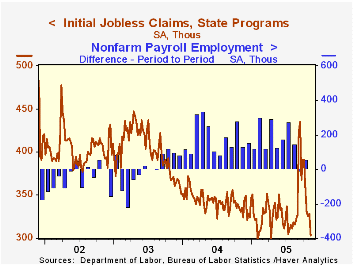 Global| Nov 17 2005
Global| Nov 17 2005Initial Claims for Jobless Insurance Lowest Since April
by:Tom Moeller
|in:Economy in Brief
Summary
A 25,000 decline last week in initial claims for unemployment insurance to 303,000 followed a little revised 3,000 increase the prior week and dropped claims to the lowest level since mid-April. Consensus expectations had been for a [...]

A 25,000 decline last week in initial claims for unemployment insurance to 303,000 followed a little revised 3,000 increase the prior week and dropped claims to the lowest level since mid-April. Consensus expectations had been for a lesser decline 320,000 claims.
The latest figure covers the survey period for November nonfarm payrolls and claims were down 54,000 (15.1%) from the October period.
The Labor Department indicated that roughly 10,000 new claims last week were related to hurricanes Katrina and Rita, bringing the total since Sept. 3 linked to the Gulf Coast storms to an unadjusted 545,000 claims. Hurricane Wilma, which struck Florida late last month, led to roughly 9,000 claims bringing the total to 16,400 related claims since that storm hit.
The four-week moving average of initial claims fell sharply to 321,500 (-4.2% y/y), the lowest level since early September.
Continuing claims for unemployment insurance rose 3,000 following a downwardly revised 5,000 drop during the prior week.
The insured rate of unemployment remained at 2.2% for the eighth week.
Spendthrift Nation from the Federal Reserve Bank of San Francisco can be found here.
| Unemployment Insurance (000s) | 11/12/05 | 11/05/05 | Y/Y | 2004 | 2003 | 2002 |
|---|---|---|---|---|---|---|
| Initial Claims | 303 | 328 | -9.8% | 343 | 402 | 404 |
| Continuing Claims | -- | 2,793 | 0.3% | 2,926 | 3,531 | 3,570 |
Tom Moeller
AuthorMore in Author Profile »Prior to joining Haver Analytics in 2000, Mr. Moeller worked as the Economist at Chancellor Capital Management from 1985 to 1999. There, he developed comprehensive economic forecasts and interpreted economic data for equity and fixed income portfolio managers. Also at Chancellor, Mr. Moeller worked as an equity analyst and was responsible for researching and rating companies in the economically sensitive automobile and housing industries for investment in Chancellor’s equity portfolio. Prior to joining Chancellor, Mr. Moeller was an Economist at Citibank from 1979 to 1984. He also analyzed pricing behavior in the metals industry for the Council on Wage and Price Stability in Washington, D.C. In 1999, Mr. Moeller received the award for most accurate forecast from the Forecasters' Club of New York. From 1990 to 1992 he was President of the New York Association for Business Economists. Mr. Moeller earned an M.B.A. in Finance from Fordham University, where he graduated in 1987. He holds a Bachelor of Arts in Economics from George Washington University.
More Economy in Brief
 Global| Feb 05 2026
Global| Feb 05 2026Charts of the Week: Balanced Policy, Resilient Data and AI Narratives
by:Andrew Cates






